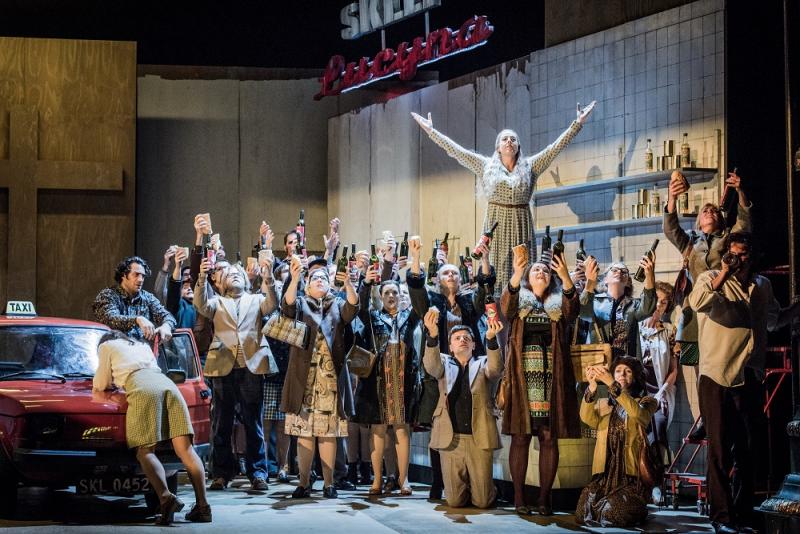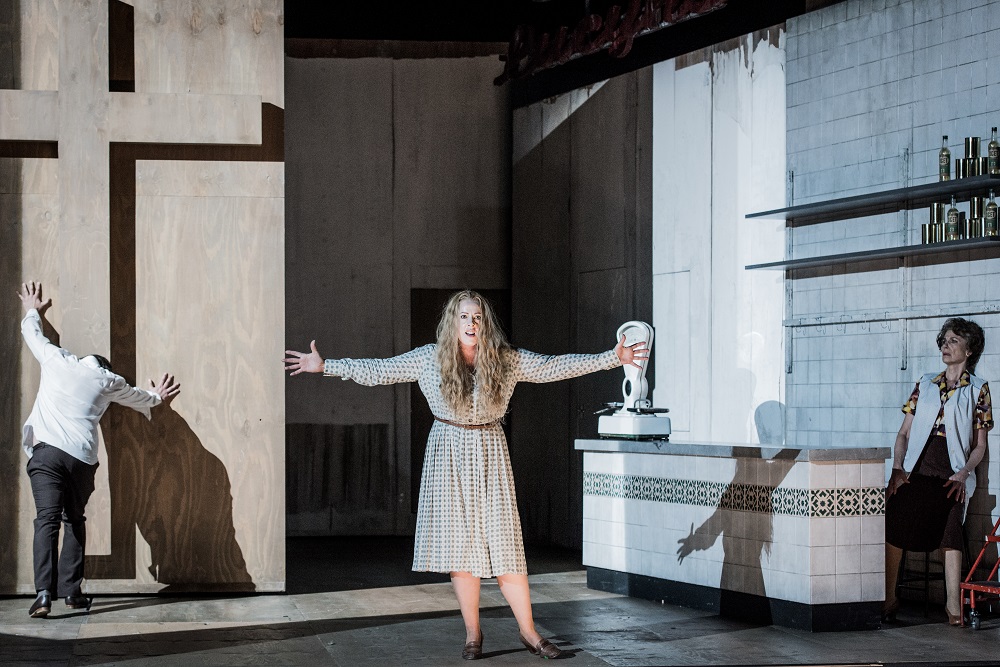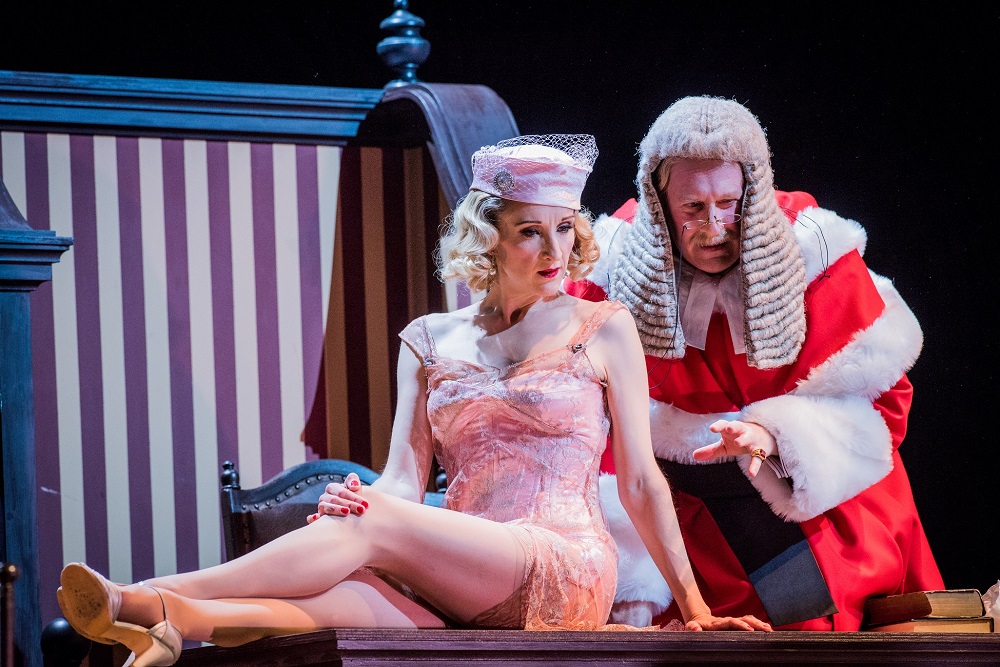Cavalleria Rusticana/Trial by Jury, Opera North review - sombre triumph and pale froth | reviews, news & interviews
Cavalleria Rusticana/Trial by Jury, Opera North review - sombre triumph and pale froth
Cavalleria Rusticana/Trial by Jury, Opera North review - sombre triumph and pale froth
Latest of 'The Little Greats' series is an uneven mix

Pairing Mascagni’s Cavalleria Rusticana with Gilbert and Sullivan’s Trial by Jury makes for a pleasingly schizoid evening in the latest of Opera North's The Little Greats series.
Instead of Mediterranean sunshine we get harsh strip lighting and peeling wallpaper: Lucia’s village shop is a distinctly bare affair dominated by a large set of scales and lots of empty shelving. There’s the occasional consignment of sausage or bread, but the obedient queues are usually leapfrogged by the pushier male villagers, presumably waving party membership cards. The sense of confinement, of petty frustration, is tangible.
What’s more remarkable is how Sofulak’s cast physically inhabits the stage: Rosalind Plowright’s Lucia stands scornfully behind her counter, her clientele an anonymous grey gaggle, all drooping shoulders and headscarves. Some of the thrills come from the contrast between what the crowd looks like and how they actually sing: this company’s outstanding chorus have rarely sounded better. The bigger roles are superbly cast: Giselle Allen’s commanding Santuzza is initially a grey, peripheral figure, physically changing as her rage and frustration develop. Turiddù is a shifty Jonathan Stoughton (pictured below with Allen and Plowright), his vocal beauty ill befitting such a character. This is a brilliantly constructed, concise opera: you’re struck by how little singing there is at so many points. Characters here stare, brood and scowl. The Easter Hymn sounds sumptuous, a necessary interlude before the bloody denouement. Katie Bray’s Lola is a fragile, ephemeral presence, and the cuckolded Alfio’s beloved taxi is a vintage Fiat, retro-fitted to look like a Trabant. Marvellous, then, with some glorious playing from Tobias Ringborg’s orchestra – harpist Celine Saout deserves a shout out.
This is a brilliantly constructed, concise opera: you’re struck by how little singing there is at so many points. Characters here stare, brood and scowl. The Easter Hymn sounds sumptuous, a necessary interlude before the bloody denouement. Katie Bray’s Lola is a fragile, ephemeral presence, and the cuckolded Alfio’s beloved taxi is a vintage Fiat, retro-fitted to look like a Trabant. Marvellous, then, with some glorious playing from Tobias Ringborg’s orchestra – harpist Celine Saout deserves a shout out.
John Savournin’s Trial by Jury has some similarly bold ideas, but can’t help feeling like pale froth by comparison. Updating the action to the 1930s and presenting Angelina as a wronged MGM starlet works nicely, allowing Savournin to insert a brilliantly choreographed prologue with Amy J Payne’s journalist introducing the scenario as a Pathé newsreel. Angelina’s bridesmaids look like 1920s flappers, and there’s a superb jury. Sullivan’s score is most entertaining when he’s sending up stodgy 19th century oratorio, and it’s striking to hear how technically accomplished this one-act piece is. Nicholas Watt’s silver-tongued Edwin is a joy, jumping on tables whilst playing the violin. He’s matched by Jeremy Peaker’s Learned Judge, able to toss a straw boater across the stage with the ease of a professional Frisbee thrower. Amy Freston sparkles and shimmies as Angelina (pictured below with Jeremy Peaker), her light, clear voice utterly right for the role. Yet everything feels a little bit too busy, too frenzied. It’s difficult to hear many of Gilbert’s wittier couplets, and there’s so much happening on stage at certain points that it becomes exhausting to watch. This short divertissement would work better in a room above a pub, with a small cast and a piano accompaniment. Still, Oliver Rundell conjures bright, fizzing colours from the Orchestra of Opera North, and Charles Edwards’ ingenious, constantly shifting set is a source of pleasure. But I can’t imagine I’ll remember much about this production in six months’ time, whereas Sofulak’s Mascagni will prove difficult to forget.
Yet everything feels a little bit too busy, too frenzied. It’s difficult to hear many of Gilbert’s wittier couplets, and there’s so much happening on stage at certain points that it becomes exhausting to watch. This short divertissement would work better in a room above a pub, with a small cast and a piano accompaniment. Still, Oliver Rundell conjures bright, fizzing colours from the Orchestra of Opera North, and Charles Edwards’ ingenious, constantly shifting set is a source of pleasure. But I can’t imagine I’ll remember much about this production in six months’ time, whereas Sofulak’s Mascagni will prove difficult to forget.
rating
Share this article
The future of Arts Journalism
You can stop theartsdesk.com closing!
We urgently need financing to survive. Our fundraising drive has thus far raised £49,000 but we need to reach £100,000 or we will be forced to close. Please contribute here: https://gofund.me/c3f6033d
And if you can forward this information to anyone who might assist, we’d be grateful.

Subscribe to theartsdesk.com
Thank you for continuing to read our work on theartsdesk.com. For unlimited access to every article in its entirety, including our archive of more than 15,000 pieces, we're asking for £5 per month or £40 per year. We feel it's a very good deal, and hope you do too.
To take a subscription now simply click here.
And if you're looking for that extra gift for a friend or family member, why not treat them to a theartsdesk.com gift subscription?
more Opera
 Albert Herring, English National Opera review - a great comedy with depths fully realised
Britten’s delight was never made for the Coliseum, but it works on its first outing there
Albert Herring, English National Opera review - a great comedy with depths fully realised
Britten’s delight was never made for the Coliseum, but it works on its first outing there
 Carmen, English National Opera review - not quite dangerous
Hopes for Niamh O’Sullivan only partly fulfilled, though much good singing throughout
Carmen, English National Opera review - not quite dangerous
Hopes for Niamh O’Sullivan only partly fulfilled, though much good singing throughout
 Giustino, Linbury Theatre review - a stylish account of a slight opera
Gods, mortals and monsters do battle in Handel's charming drama
Giustino, Linbury Theatre review - a stylish account of a slight opera
Gods, mortals and monsters do battle in Handel's charming drama
 Susanna, Opera North review - hybrid staging of a Handel oratorio
Dance and signing complement outstanding singing in a story of virtue rewarded
Susanna, Opera North review - hybrid staging of a Handel oratorio
Dance and signing complement outstanding singing in a story of virtue rewarded
 Ariodante, Opéra Garnier, Paris review - a blast of Baroque beauty
A near-perfect night at the opera
Ariodante, Opéra Garnier, Paris review - a blast of Baroque beauty
A near-perfect night at the opera
 Cinderella/La Cenerentola, English National Opera review - the truth behind the tinsel
Appealing performances cut through hyperactive stagecraft
Cinderella/La Cenerentola, English National Opera review - the truth behind the tinsel
Appealing performances cut through hyperactive stagecraft
 Tosca, Royal Opera review - Ailyn Pérez steps in as the most vivid of divas
Jakub Hrůša’s multicoloured Puccini last night found a soprano to match
Tosca, Royal Opera review - Ailyn Pérez steps in as the most vivid of divas
Jakub Hrůša’s multicoloured Puccini last night found a soprano to match
 Tosca, Welsh National Opera review - a great company reduced to brilliance
The old warhorse made special by the basics
Tosca, Welsh National Opera review - a great company reduced to brilliance
The old warhorse made special by the basics
 BBC Proms: The Marriage of Figaro, Glyndebourne Festival review - merriment and menace
Strong Proms transfer for a robust and affecting show
BBC Proms: The Marriage of Figaro, Glyndebourne Festival review - merriment and menace
Strong Proms transfer for a robust and affecting show
 BBC Proms: Suor Angelica, LSO, Pappano review - earthly passion, heavenly grief
A Sister to remember blesses Puccini's convent tragedy
BBC Proms: Suor Angelica, LSO, Pappano review - earthly passion, heavenly grief
A Sister to remember blesses Puccini's convent tragedy
 Orpheus and Eurydice, Opera Queensland/SCO, Edinburgh International Festival 2025 review - dazzling, but distracting
Eye-popping acrobatics don’t always assist in Gluck’s quest for operatic truth
Orpheus and Eurydice, Opera Queensland/SCO, Edinburgh International Festival 2025 review - dazzling, but distracting
Eye-popping acrobatics don’t always assist in Gluck’s quest for operatic truth
 MARS, Irish National Opera review - silly space oddity with fun stretches
Cast, orchestra and production give Jennifer Walshe’s bold collage their all
MARS, Irish National Opera review - silly space oddity with fun stretches
Cast, orchestra and production give Jennifer Walshe’s bold collage their all

Add comment